Common Symptoms of TMJ/TMD
Worn or Chipped Teeth
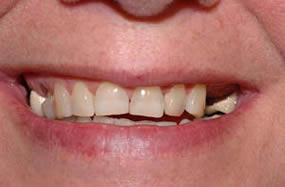 Worn or chipped teeth is by far one of the most common symptoms of clenching or grinding of teeth. Teeth are very strong, however, when there is chronic grinding and clenching, the enamel on the teeth will wear away.
Worn or chipped teeth is by far one of the most common symptoms of clenching or grinding of teeth. Teeth are very strong, however, when there is chronic grinding and clenching, the enamel on the teeth will wear away.
Most patients are not even aware that they grind their teeth, as most patients grind while they sleep. A properly trained Neuromuscular dentist can examine the teeth and identify if grinding is related to your chipped or worn teeth. They can identify and correct the cause of your grinding.
If you see that your teeth look ground down, or you find yourself clenching your teeth, contact Dr. Morgan for a consultation right away. The tooth structure that you loose can only be replaced aesthetically with porcelain restorations.
Dr. Carol F. Morgan, DDS, can help with worn or chipped teeth associated with TMJ disorders whether you live in Virginia Beach, Norfolk, Portsmouth, Chesapeake, Hampton, Newport News, York County, Williamsburg, or any other surrounding city in Hampton Roads.
TMJ Dentist Virginia Beach
Clenching and Grinding Teeth (Bruxism)
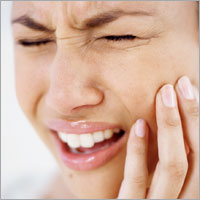 Bruxism is the dental term for the prolonged, unintentional grinding and clenching of the teeth. This usually occurs during the nighttime when the patient is sleeping. “Bruxers” are often unaware that they have developed this habit. Symptoms include abraded or chipped teeth (in extreme cases, waking up with tooth chips in the mouth); facial pain; oversensitive teeth; tense facial and jaw muscles; headaches; dislocation of the jaw; damage to the tooth enamel, exposing the inside of the tooth; a popping or clicking in the temporomandibular joint (TMJ); tongue indentations; damage to the inside of the cheek.
Bruxism is the dental term for the prolonged, unintentional grinding and clenching of the teeth. This usually occurs during the nighttime when the patient is sleeping. “Bruxers” are often unaware that they have developed this habit. Symptoms include abraded or chipped teeth (in extreme cases, waking up with tooth chips in the mouth); facial pain; oversensitive teeth; tense facial and jaw muscles; headaches; dislocation of the jaw; damage to the tooth enamel, exposing the inside of the tooth; a popping or clicking in the temporomandibular joint (TMJ); tongue indentations; damage to the inside of the cheek.
Clenching or grinding of teeth is the body’s way of telling you that it is not happy with the current position of the teeth and jaw (occlusion). It is the body’s involuntary desire to move the jaw to a more comfortable position. This back and forth movement literally grinds down the teeth as if somebody was filing down the tooth structure.
The damage that is caused to the natural tooth structure is irreversible. If the teeth are damaged too far, restorations will be needed to return the teeth to proper function and aesthetics.
An experienced Neuromuscular dentist can properly examine, test, diagnose and treat a patient who clenches and grinds their teeth returning the patient to a pain-free lifestyle.
Dr. Carol F. Morgan, DDS, can help the clenching and grinding of teeth associated with TMJ disorders whether you live in Virginia Beach, Norfolk, Portsmouth, Chesapeake, Hampton, Newport News, York County, Williamsburg, or any other surrounding city in Hampton Roads.
TMJ Dentist Virginia Beach
Teeth Sensitivity
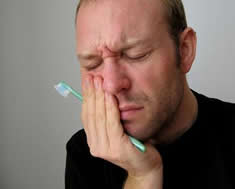 Sensitivity in teeth may take many forms. A patient may have sensitivity and pain resulting from eating or drinking hot or cold food and drink. Many indicate that they must chew on the opposite side of their mouth because of pain while chewing. It is not uncommon for a patient to start complaining of pain or sensitivity in a tooth following a dental procedure such as a filling, crown or root canal. If a recent dental procedure affects the way the teeth fit together, it may cause pain in the teeth and other TMD symptoms.
Sensitivity in teeth may take many forms. A patient may have sensitivity and pain resulting from eating or drinking hot or cold food and drink. Many indicate that they must chew on the opposite side of their mouth because of pain while chewing. It is not uncommon for a patient to start complaining of pain or sensitivity in a tooth following a dental procedure such as a filling, crown or root canal. If a recent dental procedure affects the way the teeth fit together, it may cause pain in the teeth and other TMD symptoms.
There are many reasons why a Temporomandibular (TMJ) disorder patient may have pain or sensitivity in their teeth. Patients who clench or grind their teeth frequently have sensitivity in their teeth. Patients whose bite (occlusion) does not fit properly many times apply more chewing pressure to one side of the mouth than the other.
Unfortunately, when seeking relief from a problematic tooth, many patients are misdiagnosed and may even go as far as having the nerve from the tooth removed with root canal therapy or even having the tooth extracted. The worst part is that many times these measures may not relieve the pain, and can actually make it worse.
A Neuromuscular dentist is specially trained in diagnosing Temporomandibular disorders including tooth sensitivity and pain. Many times properly aligning the bite (occlusion) will relieve and reduce the strain on the jaw and teeth resolving the issue of sensitive teeth.
Dr. Carol F. Morgan, DDS, can help your pain and discomfort associated teeth sensitivity whether you live in Virginia Beach, Norfolk, Portsmouth, Chesapeake, Hampton, Newport News, York County, Williamsburg or any other surrounding city in Hampton Roads.
TMJ Dentist Norfolk
Waking with Sore Teeth
 Waking up in the morning with sore teeth is a classic sign of temporomandibular disorder (TMJ/TMD). When the teeth do not fit together properly (occlusion) your body will subconsciously want to put the bite in a position that it finds most comfortable. As a result of the incorrect bite, the jaw will slide from the comfortable position to the “bad bite” position. Many times the teeth will be together when this occurs causing the teeth to grind or clench. The dental term for grinding teeth is bruxism. Many patients subconsciously grind their teeth at night. This chronic clenching and grinding irritate the ligaments that hold the teeth in the jaw. The irritation many times causes pain and increased sensitivity to hot and cold liquids and foods.
Waking up in the morning with sore teeth is a classic sign of temporomandibular disorder (TMJ/TMD). When the teeth do not fit together properly (occlusion) your body will subconsciously want to put the bite in a position that it finds most comfortable. As a result of the incorrect bite, the jaw will slide from the comfortable position to the “bad bite” position. Many times the teeth will be together when this occurs causing the teeth to grind or clench. The dental term for grinding teeth is bruxism. Many patients subconsciously grind their teeth at night. This chronic clenching and grinding irritate the ligaments that hold the teeth in the jaw. The irritation many times causes pain and increased sensitivity to hot and cold liquids and foods.
It is not uncommon for a patient to think they have an infected tooth needing a root canal because the pain is so severe. A properly trained dentist in Neuromuscular Dentistry and occlusion (the bite) can identify the cause of the pain and discomfort and suggest the appropriate course of treatment.
Dr. Carol F. Morgan, DDS and her team can help your pain associated with TMJ disorders whether you live in Virginia Beach, Norfolk, Portsmouth, Chesapeake, Suffolk, Hampton, Newport News, York County, Williamsburg or any other surrounding city in Hampton Roads.
Virginia Beach TMJ Dentist
Loose Teeth
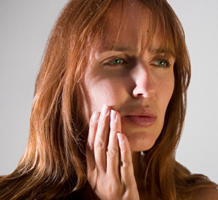 People who suffer from Temporomandibular disorder (TMJ / TMD) many times indicate that one or more of their teeth feel loose. This often occurs when they wake in the morning. This common symptom is a direct result of a patient clenching or grinding their teeth. The chronic clenching and grinding applies undue stress on the ligaments that hold the teeth into the jaw. Similar to the repeated bending of a paper clip that eventually breaks, applying repeated stresses to the teeth will loosen the grip that the ligaments have on the teeth.
People who suffer from Temporomandibular disorder (TMJ / TMD) many times indicate that one or more of their teeth feel loose. This often occurs when they wake in the morning. This common symptom is a direct result of a patient clenching or grinding their teeth. The chronic clenching and grinding applies undue stress on the ligaments that hold the teeth into the jaw. Similar to the repeated bending of a paper clip that eventually breaks, applying repeated stresses to the teeth will loosen the grip that the ligaments have on the teeth.
This condition will likely lead to periodontial disease. It is important that you find the correct skilled dentist to consult to address this problem. A Neuromuscular Dentist is trained in reducing the symptoms of TMJ / TMD and addressing the root cause of the problem. If you find that you have loose teeth, you may have the symptoms of Temporomandibular disorder. Dr. Morgan can help.
Dr. Carol F. Morgan, DDS, can help you if you have loose teeth associated with TMJ disorders whether you live in Virginia Beach, Norfolk, Portsmouth, Chesapeake, Hampton, Newport News, York County, Williamsburg or any other surrounding city in Hampton Roads.
Virginia Beach TMJ Dentist
Jaw Pain
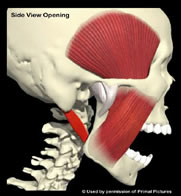 When there is disharmony with how your teeth fit together (bad bite or malocclusion), classic Temporomandiblar disorder (TMD / TMJ) symptoms may follow. Patients often complain of clenching or grinding their teeth, or having to chew on one side of the mouth or the other. These symptoms may cause unequal stresses on the muscles that are used to move the jaw during normal activities of daily living. The muscles often fatigue and become sore or spasm and cause pain.
When there is disharmony with how your teeth fit together (bad bite or malocclusion), classic Temporomandiblar disorder (TMD / TMJ) symptoms may follow. Patients often complain of clenching or grinding their teeth, or having to chew on one side of the mouth or the other. These symptoms may cause unequal stresses on the muscles that are used to move the jaw during normal activities of daily living. The muscles often fatigue and become sore or spasm and cause pain.
Many patients throughout Virginia complain of jaw pain or tiredness of their jaw muscles. They may see several dentists that may simply suggest a night guard because they usually grind their teeth. You may also be suggested to try a deprogrammer or discluder device. This type of treatment without the proper diagnostics tests and workup is like putting a bandage on a broken arm. One size does not fit all and every patient’s diagnosis and treatment plan are different.
A Neuromuscular Dentist can help alleviate jaw pain related to TMJ / TMD by realigning the bite. Once the jaw is back into its natural and most relaxed position the surrounding muscles can also resume their natural painless function.
Dr. Carol F. Morgan, DDS, can help your jaw pain associated with TMJ disorders whether you live in Virginia Beach, Norfolk, Portsmouth, Chesapeake, Hampton, Newport News, York County, Williamsburg or any other surrounding city in Hampton Roads.
 Worn or chipped teeth is by far one of the most common symptoms of clenching or grinding of teeth. Teeth are very strong, however, when there is chronic grinding and clenching, the enamel on the teeth will wear away.
Worn or chipped teeth is by far one of the most common symptoms of clenching or grinding of teeth. Teeth are very strong, however, when there is chronic grinding and clenching, the enamel on the teeth will wear away.

 Sensitivity in teeth may take many forms. A patient may have sensitivity and pain resulting from eating or drinking hot or cold food and drink. Many indicate that they must chew on the opposite side of their mouth because of pain while chewing. It is not uncommon for a patient to start complaining of pain or sensitivity in a tooth following a dental procedure such as a filling, crown or root canal. If a recent dental procedure affects the way the teeth fit together, it may cause pain in the teeth and other TMD symptoms.
Sensitivity in teeth may take many forms. A patient may have sensitivity and pain resulting from eating or drinking hot or cold food and drink. Many indicate that they must chew on the opposite side of their mouth because of pain while chewing. It is not uncommon for a patient to start complaining of pain or sensitivity in a tooth following a dental procedure such as a filling, crown or root canal. If a recent dental procedure affects the way the teeth fit together, it may cause pain in the teeth and other TMD symptoms. Waking up in the morning with sore teeth is a classic sign of temporomandibular disorder (TMJ/TMD). When the teeth do not fit together properly (occlusion) your body will subconsciously want to put the bite in a position that it finds most comfortable. As a result of the incorrect bite, the jaw will slide from the comfortable position to the “bad bite” position. Many times the teeth will be together when this occurs causing the teeth to grind or clench
Waking up in the morning with sore teeth is a classic sign of temporomandibular disorder (TMJ/TMD). When the teeth do not fit together properly (occlusion) your body will subconsciously want to put the bite in a position that it finds most comfortable. As a result of the incorrect bite, the jaw will slide from the comfortable position to the “bad bite” position. Many times the teeth will be together when this occurs causing the teeth to grind or clench People who suffer from Temporomandibular disorder (TMJ / TMD) many times indicate that one or more of their teeth feel loose. This often occurs when they wake in the morning. This common symptom is a direct result of a patient clenching or grinding their teeth. The chronic clenching and grinding applies undue stress on the ligaments that hold the teeth into the jaw. Similar to the repeated bending of a paper clip that eventually breaks, applying repeated stresses to the teeth will loosen the grip that the ligaments have on the teeth.
People who suffer from Temporomandibular disorder (TMJ / TMD) many times indicate that one or more of their teeth feel loose. This often occurs when they wake in the morning. This common symptom is a direct result of a patient clenching or grinding their teeth. The chronic clenching and grinding applies undue stress on the ligaments that hold the teeth into the jaw. Similar to the repeated bending of a paper clip that eventually breaks, applying repeated stresses to the teeth will loosen the grip that the ligaments have on the teeth. When there is disharmony with how your teeth fit together (bad bite or malocclusion), classic Temporomandiblar disorder (TMD / TMJ) symptoms may follow. Patients often complain of clenching or grinding their teeth, or having to chew on one side of the mouth or the other. These
When there is disharmony with how your teeth fit together (bad bite or malocclusion), classic Temporomandiblar disorder (TMD / TMJ) symptoms may follow. Patients often complain of clenching or grinding their teeth, or having to chew on one side of the mouth or the other. These